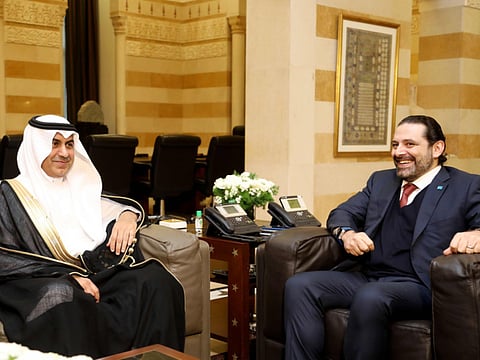Saudi-Lebanese ties, Palestine in focus
Regional papers hail ties between the kingdom and Lebanon and discuss ongoing land disputes in the occupied West Bank

Current updates in Saudi-Lebanese relations represent a return to normality, because despite regional volatility, geopolitical shifts and moments of tension, relations between the two countries over seven decades have never truly been disrupted, noted Lebanon’s Daily Star. Saudi Arabia has remained a constant friend to Lebanon.
This boost comes at a crucial time for Lebanon, with three international donor conferences scheduled in the coming months to help the country’s army and security forces, shore up the economy, and respond to the ongoing Syrian refugee crisis. “Considering the promise these recent developments bring, there is now no excuse for Lebanon not to build on this positive atmosphere and demonstrate solidarity with Saudi Arabia in particular, and with Gulf Arab countries in general, by fostering an atmosphere of fraternity and brotherly relations. This also means desisting from politically motivated campaigns against Saudi Arabia and its leaders, and instead demonstrating that rebuilding bridges with the kingdom and the Gulf is a priority.”
Riyadh has interests in Lebanon and well-established ties with the country and the whole region, wrote the London-based pan-Arab paper Asharq Al Awsat. “Saudi interests lie in good relations with all independent leaders to serve common interests, including the liberation of Lebanon and the region from Iranian hegemony, which is directed against Saudi Arabia and others. Tehran is taking over the Lebanese state to impose its territorial agenda in Syria and Iraq, and to strike a balance with Israel to serve its nuclear and regional projects. To Iran, Palestine is nothing but a bargaining chip. This is the Saudi-Iranian equation in Lebanon. Saudi Arabia’s invitation to Lebanon’s Prime Minister Sa’ad Hariri is a surprising step forward. The ploy to weaken and destroy him has been crushed, as has the attempt to empower Iran in Lebanon and the rest of the region.”
A new bill introduced by an Israeli minister that would allow land disputes in the occupied West Bank to be settled by a district court rather than being reviewed by the state’s High Court is yet another attempt to extend Israel’s illegal jurisdiction over more occupied Palestinian land, wrote the Saudi Gazette. “Not surprisingly, the bill was introduced by Justice Minister Ayelet Shaked of the pro-colonies Jewish Home Party, who has openly advocated the genocide of the Palestinian people. In a place where there is no equality between a Palestinian resident and that of an Israeli, and a huge gap separates the rights of the two groups of residents, Israel is obligated to actually protect the rights of those subject to its occupation. This new legislation does not fulfil this duty.”
The editorial of Palestinian paper Al Quds called for a more active European role as the possibilities of peace in Palestine are looking slimmer by the day. The paper noted that the European Union cannot act independently without the US, but it can exert pressure and activate its theoretically limited role. “The EU must not only issue statements, but also take into consideration that the union has taken courageous stands in the UN Security Council and General Assembly in support of the Palestinians’ national rights and against the US’ blind bias towards Israel. The EU also rejected US President Donald Trump’s decision declaring [occupied] Jerusalem as the capital of Israel. It is worth noting that is in the union’s economic and political interest that the region does not fall into more bloodletting and instability.”


